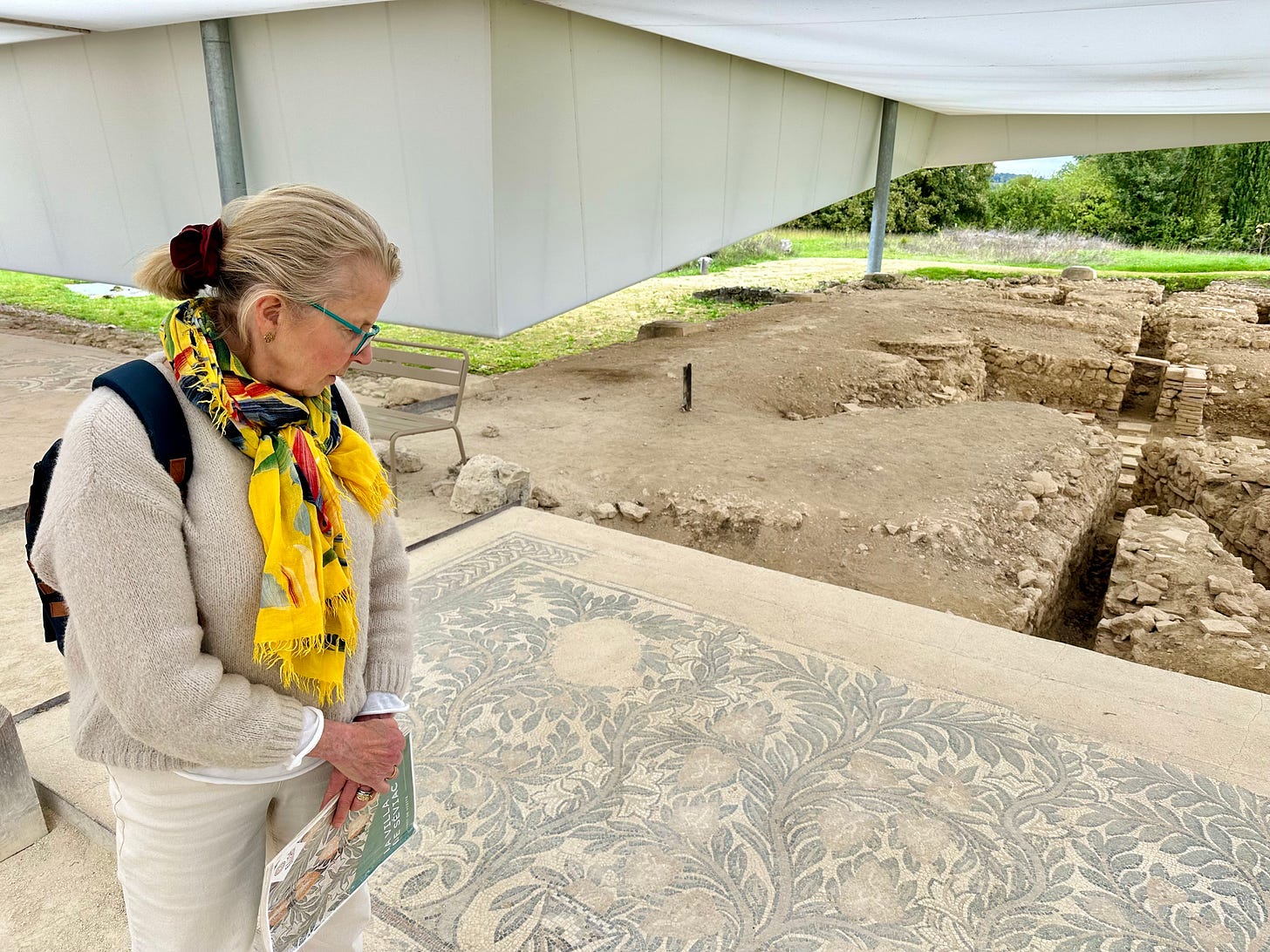💬 [B]old Women: How trustworthy are your memories?
My cousin has different memories of my grandmother; we'll never know the truth.
Sam and I drove through the Armagnac region of Southwest France last week. We stopped to see the ruins of the 4th century Villa de Séviac1, famous for its magnificently-decorated and perfectly-preserved mosaic floors.

The tile floors, laid bare after decades of archaeological digging on what was once a farm, made me reflect on the multiple layers of history (in this case, over 1,700 years) that you find everywhere in Europe, so much deeper than our history in the U.S.
And it made me think about layers of my memory, going back years and decades, and how perfectly-preserved it is–or isn’t.
It’s sometimes hard to know, in [b]old age, if something actually happened the way I am remembering it, or if the memory, has, like me, been shaped little by little, over years of living, until the memory is altogether different from the event. Like so many of us at this later stage of life, I relish calling up the sensory-laden scenes from my childhood, my early days of marriage, or images of my adult children when they were tiny.
Specifically, I’m curious about the memories that we call up and use in a personal essay to tell a story about our past, our childhood, and/or our relationship with parents or siblings.
Recently, a close cousin emailed to say she had a different memory of my maternal grandmother than what I expressed in my essay about my mother. I absolutely adored my Granny Eliza, as I called her, and I reminded my cousin that I had made that point in the essay. Still, what my cousin objected to was my suggestion that my grandmother was an alcoholic and that was the reason she had locked herself in her room for days at a time. I think this was most likely the case, from what I’ve heard through family stories, but perhaps there is another explanation. Perhaps my grandmother struggled with depression. The point is, I will never know exactly.
The email was followed by a good phone conversation and we agreed to disagree…or at least to admit that neither one of us had any way of knowing with certainty what had happened and what kind of mother my grandmother had been. In any event, I have removed the word “alcoholic2” from my essay and substituted “had a drinking problem.”
MY QUESTION FOR YOU: When you write about your parents or other close family members, how do you know whether your memories are accurate? Does it matter, if you feel it’s your lived experience?
If presented with enough evidence, are you willing to change your memories (and writing)?
More about the Villa de Séviac.
I don’t place a stigma on the word “alcoholic” any more than I do on “depression.” Some may, however, so the vaguer phrase of “drinking problem” seems like a better choice for the wording in my essay.
![[B]OLD AGE with Debbie Weil](https://substackcdn.com/image/fetch/$s_!i8Z0!,w_80,h_80,c_fill,f_auto,q_auto:good,fl_progressive:steep,g_auto/https%3A%2F%2Fsubstack-post-media.s3.amazonaws.com%2Fpublic%2Fimages%2Fdaaca764-d8d6-4a1b-bf58-61dbb72810fc_842x842.png)
![[B]OLD AGE with Debbie Weil](https://substackcdn.com/image/fetch/$s_!fEcd!,e_trim:10:white/e_trim:10:transparent/h_72,c_limit,f_auto,q_auto:good,fl_progressive:steep/https%3A%2F%2Fsubstack-post-media.s3.amazonaws.com%2Fpublic%2Fimages%2F95ad4442-e435-4ebc-a8d2-9c9b89a8bdb6_2100x400.png)

![[B]OLD AGE with Debbie Weil](https://substackcdn.com/image/fetch/$s_!i8Z0!,w_36,h_36,c_fill,f_auto,q_auto:good,fl_progressive:steep,g_auto/https%3A%2F%2Fsubstack-post-media.s3.amazonaws.com%2Fpublic%2Fimages%2Fdaaca764-d8d6-4a1b-bf58-61dbb72810fc_842x842.png)


Memories are like fingerprints, unique to each of us, based on personal perceptions and our own secret-from-ourselves subconscious. And like fingerprints, they change over time, as the deep grooves and swirls smoothen and disappear over years of use. Be amazed at the unfolding of all the “me’s” you’ve been, even in your recollections. After all, is accuracy really the point?
Great question to ponder. When writing about an experience from childhood, I tend to leave intact whatever my memory is because regardless of the facts, it is the memory of that experience I’ve carried with me for so long and that helped shape my world view.
And then sometimes the discovery of an alternate reality can produce a whole other writing experience that explores what the old memory meant and how the new reality might cause me to rethink everything. etc etc.